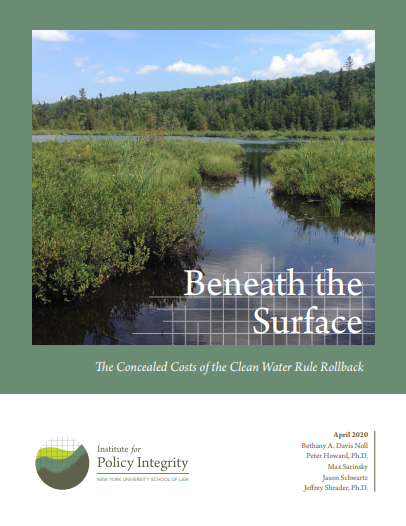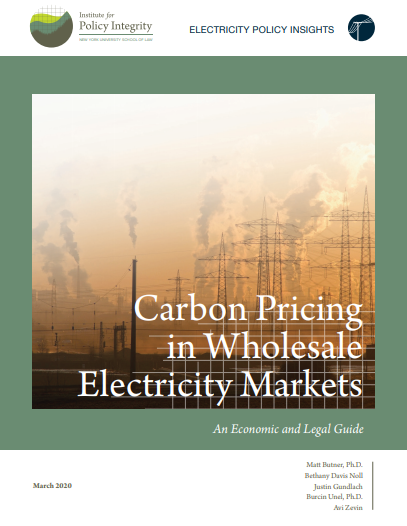-
Beneath the Surface
The Concealed Costs of the Clean Water Rule Rollback
In restricting the scope of the Clean Water Act through two regulatory rollbacks, the Environmental Protection Agency and Army Corps of Engineers claim that the estimated compliance-cost savings exceed the environmental harms (in the form of forgone benefits). Yet these analyses suffer from severe methodological flaws. And correcting the analyses would very likely show that the rollbacks are net costly to society, depriving the public of potentially billions of dollars in annual forgone benefits. As detailed in this report, the agencies’ failure to meaningfully assess the substantial harms that will result from their rollbacks violates both regulatory precedent and the agencies’ legal obligations.
-
New Resource Tracking Reduced Enforcement of Environmental Laws in Response to COVID-19
The Institute for Policy Integrity is tracking altered enforcement of environmental laws by federal and state agencies in response to the COVID-19 pandemic. In connection with the crisis, several agencies have issued waivers or announced plans to stop enforcing key environmental laws and regulations.
-
Comments to the Colorado Public Utilities Commission on Electricity Rule Changes
The Colorado Public Utilities Commission is amending its rules relating to utilities, electric resource planning, and renewable energy standards. We submitted comments explaining why the Commission should use Social Cost of Greenhouse Gases estimates to monetize the externalities of carbon pollution. Our recommendations include rule revisions and new language that will help include monetized estimates of climate impacts in all relevant decisionmaking. We also submitted comments and reply comments on additional rule revisions, building on our original comments to further describe how the Commission can best express and apply the Social Cost of Greenhouse Gases.
-
Amicus Brief on EPA’s Clean Power Plan Replacement Rule
Last year, the Environmental Protection Agency (EPA) replaced the Obama Administration’s Clean Power Plan, which sought substantial cuts in greenhouse gas emissions from power plants, with the so-called Affordable Clean Energy (ACE) rule, a far weaker policy that will, at best, yield modest reductions below business-as-usual emissions and, at worst, increase pollution from the electric sector. We filed an amicus brief in the U.S. Court of Appeals for the D.C. Circuit highlighting three key errors in EPA’s rationale for repealing the Clean Power Plan. Specifically, we explain, EPA misstates regulatory precedent and Clean Air Act legislative history supporting the Clean Power Plan and disregards the substantial harms that the ACE Rule will cause.
-
Comments to FERC Supporting Petition for Technical Conference on Carbon Pricing
Advanced Energy Economy, the Electric Power Suppliers Association, and a diverse group of other stakeholders recently filed a petition for the Federal Energy Regulatory Commission (FERC) to hold a technical conference on carbon pricing in organized wholesale electricity markets. We have worked extensively to study and promote carbon pricing, publishing a comprehensive report and several academic articles. We also hosted a conference that brought together experts and stakeholders to discuss related legal, economic, and policy questions. Our comments to FERC highlight our previous work on wholesale market carbon pricing and express our support for the requested technical conference.
-
Comments to FERC on Lamar County Natural Gas Project
The Federal Energy Regulatory Commission’s (FERC) environmental assessment estimates that the Lamar County Expansion Project would result in 3.87 million metric tons of greenhouse gases from downstream emissions. We submitted comments suggesting that FERC monetize climate impacts using social cost of carbon estimates. The proposed natural gas project would result in over $200 million in annual climate costs.
-
Comments to EPA on Coal Combustion Residuals Rule
Coal combustion residuals, commonly known as coal ash, are the residual substances that remain after burning coal. They contain several chemicals that are toxic to human health, including arsenic, boron, lead, and mercury. The Environmental Protection Agency (EPA) proposed a rule that amends the regulatory framework for the disposal of coal ash. We submitted comments in January detailing how EPA fails to analyze the forgone benefits of the regulatory changes, which extend deadlines and eligibility for facilities that lack appropriate disposal capacity. We also submitted comments in April focusing on the second part of EPA's proposal, which fails to assess the forgone benefits of allowing facilities to seek approval for alternative basin liners.
-
Key Economic Errors in the Clean Car Standards Rollback
The federal Clean Car Standards promised steadily increasing fuel efficiency and lower vehicle emissions. The National Highway Traffic Safety Administration and the Environmental Protection Agency have now rolled back those standards, eviscerating important public health benefits and fuel savings for consumers. But the agencies’ own analysis shows that the rollback will cause more harm than good for society. And even the slight benefits that the agencies find under certain assumptions are premised on a flawed economic analysis that is riddled with problems.
We released a resource that explains the main economic problems with the rollback’s justification, identifying several critical errors and detailing how they invalidate the agencies' own claims
-
Carbon Pricing in Wholesale Electricity Markets
An Economic and Legal Guide
This report explains how carbon-pricing rules in organized wholesale electricity markets can improve economic efficiency. It then explores the economic principles and legal requirements for RTOs, states, and the Federal Energy Regulatory Commission to consider when implementing a carbon-pricing rule in organized wholesale electricity markets. And it identifies several policy-design approaches that, to varying degrees, meet those economic principles and are likely to be found legally permissible.
-
Comments to EPA on Federal Emissions Management from Oil and Gas Sources in Utah
The Environmental Protection Agency’s (EPA) Federal Implementation Plan (FIP) for managing emissions on the Uintah and Ouray Indian Reservation in Utah proposes control requirements for new, modified, and existing oil and natural gas sources. Despite forecasting that the requirements would lead to a substantial decrease in methane emissions, EPA severely underestimates resulting benefits through the use of an “interim” social cost of methane metric that disregards the best peer-reviewed science. We submitted joint comments detailing EPA’s failure to adequately monetize and evaluate the benefits of the FIP.






